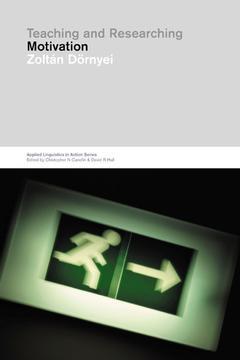Description
Teaching and researching motivation
Author: DORNYEI Dr Zoltan
Language: English
Approximative price 36.09 €
Subject to availability at the publisher.
Add to cart312 p. · 22.9x15.2 cm · Paperback
Description
/li>Contents
/li>Comment
/li>
These are some of the key questions covered by Teaching and Researching Motivation. The book:
* provides a theoretical summary of the various facets of motivation
* examines how the theoretical insights can help classroom practitioners in their everyday teaching practice
* looks at how motivation can be researched and assessed
* offers practical recommendations and tips
The final section of the book contains a variety of useful resources, including relevant web-sites, lists of key reference works and over 150 actual questionnaire items that the author has successfully used in the past. This section can also be found on the Teaching and Researching Motivation companion web-site.
Written in a highly accessible style and illustrated with many concrete examples, Teaching and Researching Motivation is an invaluable resource book for teachers and researchers alike.
Dr. Zoltan Dornyei is the Co-Director of the Centre for Research in Applied Linguistics in the School of English Studies at the University of Nottingham. He is the author of several books, including Conversation and Dialoges in Action (1992, co-authored with Sarah Thurrell) and Interpersonal Dynamics in Second Language Education: The Visible and Invisible Classroom (1998, co-authored with Madeline Ehrman).
Section 1: What is Motivation?
1. Main Challenges of Motivation Research: The challenge of consciousness vs. unconsciousness, The challenge of cognition vs. affect, The challenge of reduction vs. comprehensiveness, The challenge of 'parallel multiplicity' , The challenge of context, The challenge of time
2. Theories of Motivation in Psychology: Leading motivation theories in psychology, Sociocultural and contextual influences on behaviour, The temporal dimension of motivation
3. Motivation to Learn a Foreign/Second Language: Gardner's motivation theory, Expectancy-value theories and L2 motivation, Self-determination theory and L2 motivation, Schumann's neurobiological model, Constructs emerging from empirical studies, L2 motivation and the social context, The temporal dimension of L2 motivation, Dornyei and Otto's Process Model of L2 motivation.
Section 2: Motivation and second language teaching
4. 'Education-Friendly' Approaches in Motivation Research: The educational shift in L2 motivation research, Educationally motivated constructs
5. Motivation and Motivating in the Foreign Language Classroom: Motivational techniques, strategies and macrostrategies, A framework for motivational strategies, Motivational macrostrategies
6. Student demotivation: 'Demotivation' vs. 'Motivation' , Research on demotivation in instructional communication studies, Findings in L2 motivation research, Concluding remarks on demotivation
7. Teacher Motivation: Conceptualising the 'motivation to teach' , The Relationship between teacher motivation and student motivation.
Section 3: Researching motivation
8. Making Motivation a Researchable Concept: Inherent problems in motivational research, Initial decisions to make
9. Methodological Issues and Considerations: Research Design, 'Self-report' motivation tests/questionnaires
10. Main Types of L2 Motivation Research: Survey studies, Factor analytical studies, Correlational studies, Studies using structural equation modelling (LISREL), Qualitative studies, Towards a combined use of quantitative and qualitative studies.
Section 4: Resources and furthe information
11. The Locus of Motivation Research: Linkages to other Topics and Disciplines, Language learning motivation and related disciplines in the social sciences, The place of motivation research in applied linguistics
12. Sources and Resources: Relevant journals and magazines, Databases, abstracting journals and discussion groups, Sample tests and measurement instruments
- Offers an up-to-date summary of the latest developments in both applied linguistics and motivational psychology.
- Provides a theoretical summary of the various facets of motivation.
- Covers both theory and practice in a down-to-earth and accessible style.
- Includes concrete research guidelines and tips for both novice and experienced users.
- Examines how the theoretical insights can help classroom practitioners in their everyday teaching practice.
- Looks at how motivation can be researched and assessed, describing the main research traditions and offering many practical recommendations and tips.
- The final section of the book contains a variety of useful resources, including relevant web-sites, lists of key reference works and over 150 actual questionnaire it
These books may interest you

Teaching and Researching Motivation 160.25 €

Teaching and Researching: Motivation 160.25 €


